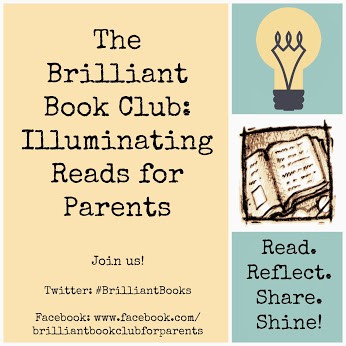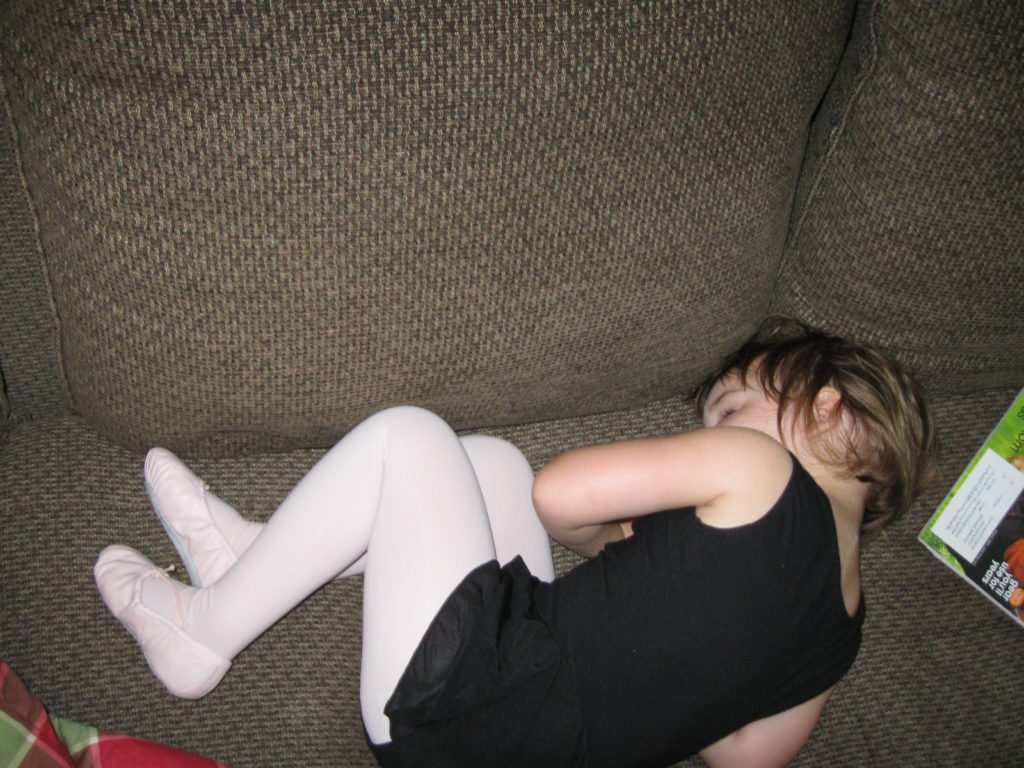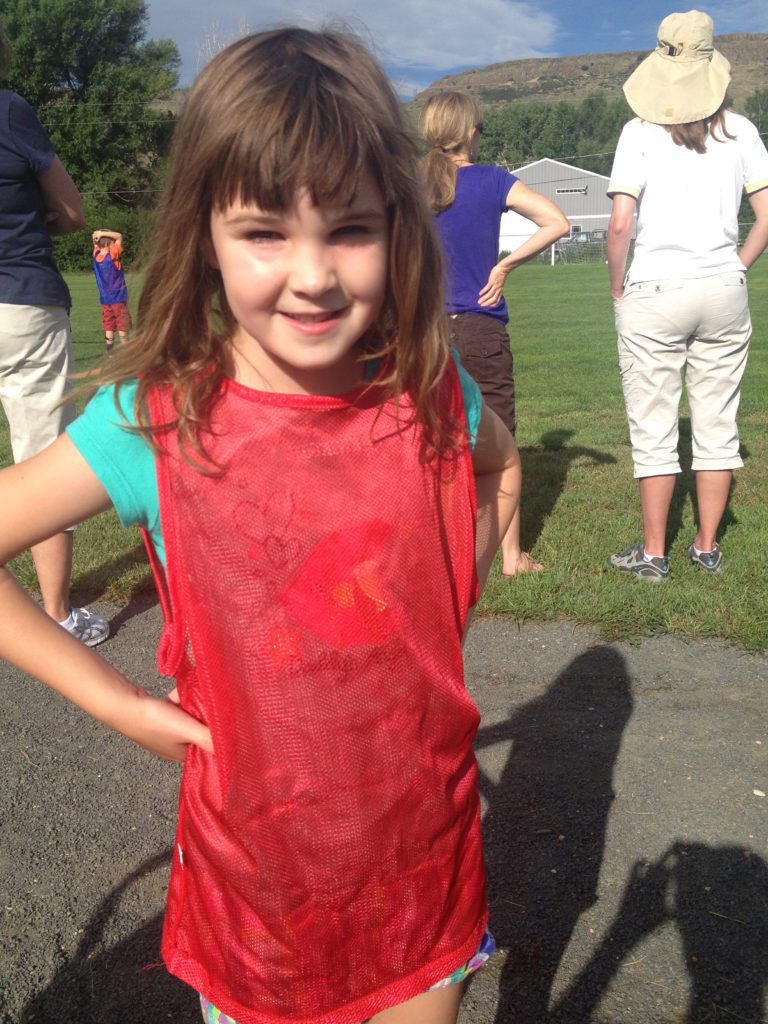 Today is our inaugural post in the Brilliant Book Club Series, our first of two posts on Hilary Levey Friedman’s Playing to Win. The Brilliant Book Club is a collaborative project among five bloggers: Lauren Apfel of Omnimom, Deb CG of Urban Moo Cow, Sarah Rudell Beach of Left Brain Buddha, Jessica Smock of School of Smock and Stephanie Sprenger (Me!) of Mommy, For Real.
Today is our inaugural post in the Brilliant Book Club Series, our first of two posts on Hilary Levey Friedman’s Playing to Win. The Brilliant Book Club is a collaborative project among five bloggers: Lauren Apfel of Omnimom, Deb CG of Urban Moo Cow, Sarah Rudell Beach of Left Brain Buddha, Jessica Smock of School of Smock and Stephanie Sprenger (Me!) of Mommy, For Real.
The Brilliant Book Club is for parents who want to read the latest books about parenting — from research-based books on parenting practice to books that reflect on the emotional and personal aspects of childrearing. For more information, read our introductory post here. We will be sharing our posts on each book on the last Monday of every month.
Playing to Win is an in-depth look at the competitive culture of kids’ after-school activities, and focuses in particular on soccer, chess, and competitive dance. Levey Friedman examines the evolution of recreational pastimes for children, most specifically on the professionalization of competitive after-school activities. I found it fascinating to read about the history of competition in America; even General George Patton claimed, “Americans play to win all the time.” Levey Friedman notes that ours is a success-oriented society, in part because of Protestant roots that emphasize work ethic. Developmental psychologist Jean Piaget remarked on what he referred to as The American Question- parents who routinely asked if it was possible to speed up children’s development.
I was prepared for a discussion on the psychological and historical implications on this emphasis on competition in children’s “leisure” activities. But there is a crucial component to Playing to Win that I will admit I was not at all prepared for- the implication that children’s participation in recreational activities is directly linked to successful college admission. I was somewhat dumbfounded to read about this connection between competition in childhood somehow preparing children for college entrance exams and career success, and I felt slightly chagrined by my response. I mean, isn’t it kind of naive that I, as the mother of two children, would not be in touch with this phenomenon?
Parental Anxiety and Kid Performance
According to Levey Friedman, there is a definite link between parents’ anxieties about their elementary school-aged kids’ futures, particularly the significance of educational credentials, and their specific parenting strategies. Parents are fueled by a desire to develop credentials for their children- they believe that this is essential in order for them to gain entry into the “good life” of the upper-middle class and all that goes along with it. Parents are driven by this fear, and as Levey Friedman states,
Parents worry that if their children do not participate in childhood tournaments they will fall behind in the tournament of life.
One of the fascinating terms featured in Playing to Win is “Competitive Kid Capital.” The five characteristics of Competitive Kid Capital, according to the book, are:
- Internalizing the importance of winning.
- Bouncing back from a loss to win in the future.
- Learning how to perform within time limits.
- Learning how to succeed in stressful situations.
- Being able to perform under the gaze of others.
From this point of view, after-school activities are absolutely necessary to supplement grades and test scores- they are a crucial opportunity to develop Competitive Kid Capital. Levey Friedman notes that Baby Boomers and their children, the Echo Boomers, face a “competitive landscape that is more crowded than in previous generations”, with stakes that are even higher. Parents have subsequently assumed responsibility for their children’s college admission success or failure. According to Levey Friedman, these zealous parents are not crazy; she states, “Their children face very real gates and gatekeepers through which they need to pass if they are going to achieve in ways similar to their parents.”
It is apparently a common practice for kids to participate in three or more organized activities per week, or one focused activity for at least four hours a week. I found this discussion to be very interesting as a supplement to our exploration of Parenting Without Borders, particularly the chapter on academic pressure. In contrast with some Asian cultures’ zeal for academic excellence, in many ways the American craze is similar, but as Levey Friedman points out, is cloaked in the pretense of “fun.”
How Much Is Too Much?
I am sure that many of us have shaken our heads upon hearing of yet another crazy parent who has sued a preschool for ruining her child’s chance to get into an Ivy League school, but for many parents, this early pressure is a definite reality. Levey Friedman discusses test preparation “boot camps” for kindergarten and preschool admission; I would be lying if I said I didn’t find this practice to be nauseating. Is it really appropriate for four and five year olds to have that kind of pressure? Levey Friedman notes that some parents are definitely grooming their children for the Ivy League as early as preschool. Are we seriously supposed to be thinking about college entrance exams when we sign our children up for T-ball or shop around for preschools? This seems absurd to me.
Playing to Win sheds light on just how intense some after-school activities are these days. Levey Friedman goes into great detail when describing the chess, soccer, and dance programs she observed, and to be honest, the intricacies, dedication, expenses, and intensity kind of blew me away. Recreational sports have come a long way over the past decades- it is common practice for soccer teams to have a full-time paid coach, a complex hierarchical division, a year-round season, and travel expectations.
I wondered if some of this hard-core devotion detracts from the enjoyment for the kids. I mean, isn’t it all just a little bit much? I snorted when I read Levey Friedman’s remark that it is common practice when a successful child quits an activity to say that they have “retired.” (In reality, the actual note I placed by this passage read, “WTF?”)
Bring Back the 1980s!
Levey Friedman chronicles the evolution of after-school activities, and discusses how the post-WWII decades were the beginning of competitive activities being dominated by the middle class. This was the time period when Little League came into existence. She references the “Explosion of Hyper-competitiveness,” an era that spans the 1980s until today. As a child of the 80s and 90s, I was technically raised during this era of competitiveness, but I guess I just never experienced my after-school activities that way.
I took piano lessons from age 8 through 19, voice lessons in high school, and I participated in marching band and several vocal ensembles as well. I took dance classes from ages 6-10, and I participated and placed in our local spelling bee several years in a row. So it’s not like I didn’t experience activities that may have unintentionally contributed to my Competitive Kid Capital. But let’s be honest- my own spelling bee triumphs in 1986 certainly pale in comparison to the current spelling bee champ standards.
I competed in musical competitions during my teenage years- some as individual performances, but many as part of a choir, elite vocal ensemble, or large marching band. I felt that the prevailing lessons with our competition and victories related more towards team connection and sportsmanship; the high we experienced when winning was thrilling, but it never seemed like it raised my own personal self-esteem.
I will admit- I felt a tremendous amount of disdain when I began to consider the link between competitive activities and college admission. And then I reflected for a moment; perhaps the poise I gained from singing in front of judges, or marching on a field during freezing conditions against formidable opponents, (you’d better not be mocking the seriousness of marching band competitions right now) and the hard work that went into preparing for a vocal competition really did prepare me for college and the work force. Maybe I am kidding myself that participation in these events is irrelevant to college planning.
Am I Setting My Own Children Up For Failure?
All of this reflection left me with one disconcerting thought: Am I doing my children a disservice with my somewhat lazy approach to recreation? My youngest child just turned 2, and given her rank as Kid #2, she has done jack squat for organized classes. This fact bothers me very little. Her older sister took swim lessons as a toddler, (we quit because I would rather poke my eyes with pencils than continue to wrangle her in the pool and locker room) less than one year of dance at age 3, (we quit because the loud music bothered her) a year of gymnastics in kindergarten, (we quit because the coaches yelled at her for waving at her parents) six months of ballet/tap in 1st grade, (we quit because she just didn’t like it) and now we are on our second year of hip-hop dance.
Notice a pattern here? We have also tried a few summer camps that focused on soccer, and while she participated somewhat willingly, she wasn’t exactly enthusiastic about it. (Or coordinated. But I digress.) My daughter lacked any serious motivation or commitment to her classes, and it is clear to me that she is not a prodigy at anything we have tried yet. That is fine with us. She will likely begin piano lessons soon, and I’m sure she will participate in music ensembles when she is older.
I think about our family, my daughter’s unique temperament and sensitivity, and it is clear to me that we all benefit by seriously limiting our after-school activities. But am I missing the boat by being lackadaisical about her Competitive Kid Capital? Am I failing to prepare her for college admissions and her future career? Am I (shudder) being a lazy parent?
We have one more discussion on Playing to Win at the end of October. I have not yet finished the book, and I am eager to find what the ultimate take-away message will be for me as a mother of an elementary school child. Should I be pushing harder? Is it really necessary for me to consider the skills she is lacking because of our haphazard leisure opportunities? Or perhaps we are simply enjoying her childhood, and savoring the years in which she gets the luxury of postponing a sense of planning and pressure. Perhaps, for now, she is just playing for fun.
Don’t forget to read the other fantastic posts in our discussion today:
From School of Smock:In Praise of Parenting…Like a Sociologist?
From Left Brain Buddha: The I.V. League? Being Mindful of Why We Compete
From Omnimom: Playing to Play (And Not To Get Into College)
From Urban Moo Cow:How Harmful is a Culture of Winning At All Costs?













I literally was just talking about this with Kevin’s parents last night and so do not understand why every kid nowadays has to be taking tons of extracurricular classes and every kid needs to be the best. I was in Girls Scouts and that was it growing up. Otherwise, I played outdoors and kept myself fully entertained. Not saying that what I did was right, but I didn’t turn out any worse for the sea. Just don’t understand why kids can’t be kids a bit longer these days. Truly boggles my mind and was glad to see the issue being raised here. Thanks Stephanie!
It’s an interesting discussion, isn’t it? My fondest memories of childhood were simply the FREE time I had to play with friends, neighbors, and my brother.
My 2nd child has also been given the short shrift on activities…somehow, despite what this book claims, I think it is actually serving her better! 😉 Or at least that is what I am telling myself! I never felt the recreational pressure from activities that exists today. I am not interested in my children joining “travel anything”, so if that keeps them out of Harvard, then I will have to get over it!-Ashley
I’m with you- just not worth it. 🙂
Personally, I do not think you’re a lazy parent. I’m glad you quit that stupid gymnastics class – a coach yelling at a kid for waving to her parents? Childhood is supposed to be fun. Yeah, sure, participate in activities. Learn about winning and losing. But have some fun. These freaks who care about their kids getting into Ivy League schools when they’re in preschool and kindergarden are just weird. Maybe I suck but I could care less if my son goes to Ivy League. I mean sure, I want him to go to college. But now that I’ve been working for more than 20 years, I realize that nobody cares where you went to school. Nobody. Not in my normal, happy, educated, learned to win (and lose) life, anyway. I don’t think I’d want to live in that other world.
I know. She was five. And she wasn’t exactly awesome at it. The “hardcore” mentality let me know that it was NOT the class for us. And I think your last point about people not caring about where you went to school is actually right now. Thanks for that comment!
I was in a ton of activities in any given year, and so was my brother (we’re talking late ’70s into the ’80s here). But the point wasn’t to excel; my parents wanted us to explore interests and learn about different things, gaining an appreciation for them. I was in Girl Scouts, played piano, took ballet, and for several springs was on a softball team (a different one every time, mind you). My brother’s schedule was similarly full.
We learned about hard work, achievement, commitment, and teamwork. And we didn’t have to continue with something we didn’t like, although we did have to finish whatever was paid for.
Thanks for that comment, and you are so right- I too learned a lot about hard work, achievement, commitment, and teamwork. But there was never this contrived notion that these activities were my ticket to collegiate success. And I’m grateful for that.
Stephanie, we are in the lazy parenting club together! I loved this! One very interesting thing that you discuss from the book is that, even though we had a ton of activities as children of the 80s, they were not of the same competitive nature as the ones explored in PTW. In that way, we were playing to play then as well, just in a more structured way (and, in my case, with a view to getting into a ‘good’ college). I honestly do not know what I would do if I lived in America. I value education hugely, but I hate the idea of dragging my kids around to one class after the next for the sake of it. I want them to be exposed to different pursuits, and find their hobbies and passions, but I want it to happen in a much more organic way.
Yes- a more organic way! I too want my children to try many different things to find their passion. I think your approach is very healthy, and reading about your own educational/recreational experience was SO fascinating! Thanks, Lauren!
I agree with Lauren — we all did a lot of activities growing up (as I outlined in the comment to her essay), but they lacked the PRESSURE and IMPORT of today’s activities. (ps – we also quit swimming after two “semesters” because damn if I was going to cart us over there and put on a tankini and change him screaming on the floor of a dirty YMCA locker room.)
I want to scream out to you — NO! You are not doing your children a disservice, just the opposite! But I also have that gnawing fear in the back of my mind. Like I said in my post, do I really have to do this???? Someone please tell me we don’t….
I appreciate knowing I’m not alone in my uncertainty, Deb, so thanks! And um yeah, swimming lessons with a toddler is my idea of hell. Not. Fun.
As I write in the conclusion, every parent I met while researching the book expressed ambivalence. You are not alone!
I think that in the American culture of competitiveness we really underestimate the value of free imaginative play. Kids need unstructured time to explore and just be kids – it’s good for their cognitive and emotional development (and no, I’m not a parent, but I did study psychology). If they don’t have that time, they don’t learn the value of motivational-based learning – why would they, if everything is already set up for them?
Don’t get me wrong – organized activities like music lessons and sports are valuable educational tools as well. I just think the current culture of competitiveness takes it too far.
I really appreciate your perspective, Natalie, and I don’t think you have to be a parent to have the right perspective on this. In fact, perhaps it makes you MORE clear-headed on the subject! I agree with you wholeheartedly.
You raise a lot of good points, ones that so many of us grapple with regarding sports and activities. I always had the attitude that I wanted to expose my boys to different activities, but if after one “season” or “class” they decided they didn’t want to continue, that was a-okay with me. And I suppose that raising my first two boys in the ultra-competitive scene of NYC for the first few years of their lives completely turned me off to pushing my kids into anything. I witnessed some crazy-ass parents who did things like teaching their kids to read in pre-school because they wanted them to be ahead when they got to kindergarten and standing on line at 6am to make sure their kid got a spot in the best swim class…no way, so not for me!
I’ve read some of your reflections on the competitiveness of parenting in NYC, and I can’t really imagine what that would feel like. I think I would have been eaten alive. I appreciate hearing your perspective on the subject, Emily!
Just this morning at the Children’s Museum, I sat across from two moms at toddler time who were discussing how they stay up at night planning out fall and Halloween crafts and make lists of milestones they want to work on for their toddlers to make sure they are ready for kindergarten. I looked at my son who is not quite 2, but quite verbal for his age, knows many colors and is starting to get familiar with numbers, and who is also showing signs of emotional intelligence and empathy and told myself that I refuse to feel guilty because I haven’t made a list of “milestones” to work on with him. But more power to those other two moms. I’m sure their daughters will be honor students some day.
Yes- more power to them. Or something. I guess I am not quite that deliberate when it comes to my toddler’s learning! 😛
Stephanie, I think we wrote very similar posts! I, too, wonder how much of ‘me’ is due to learning how to compete and perform and all the other lessons from competitive activities. I think so much of this is that if it really is about the winning, then all the other lessons are often lost. And it is sad that by time time kids get to junior high, the only real option is to participate through competition. And so many of these activities, as Deb pointed out, are “zero-sum,” in that by their very nature there will be winners and losers, even if records aren’t kept. I am eager to keep reading in the book about these questions….
It’s been really interesting, hasn’t it? A lot of the competitive experiences I had growing up inevitably shaped me as well, but I sort of poo-poohed this notion that it is tied to future success. I too am anxious to see how the book wraps up…
Great take on the issue, Stephanie. I also feel so conflicted. I think competition is good, BUT we are not willing to put in the time it takes to be part of these leagues. We won’t let the kids play on the Jewish Sabbath (Friday nights and Saturdays) so that for sure limits (not the worst thing) the things we can have the kids commit to doing. For sports, I’m a fan of the house leagues, which do not require travel!
I guess I also don’t value college admissions that much . . . which is another piece of this puzzle. I’ve seen so many friends succeed . . . many went to state schools or lesser-known places. Just something to think about!
Thanks Nina. I appreciate your perspective, and I agree that sometimes the value of which university one attends is overrated. Many (most?) of my good friends are perfectly successful on their career path, and attended a “regular” school. It has never occurred to me to shoot for the moon with my own children’s college admission selections!
Very interesting! I was raised on team sports and played tennis, basketball, & softball for all four years of high school. My dad was a high school basketball & baseball coach and my brother played sports as well. It was just part of our family culture.
However I have three daughters who are not sports enthusiasts. We have managed to pack our schedule, though, with after school activities. I sometimes wonder if the stress of the schedule outweighs the benefits of the activities.
I also have a BIG problem with parents who force their kids to participate in something they do not enjoy. My middle does play soccer now, though she got a bit of a late start with it. Last night, a kid on the other team came off the field crying. (Not sure why he was upset; he was not hurt). A man I presume to be his dad cam over to the bench, got in his face, and told him to “man up.” They are 8 and that kind of pressure and ridicule absolutely ridiculous.
Now, I’m rambling, but the overall point is that it is a fine balance between enough and too much coupled with the children’s interests.
Not rambling at all- a very cogent comment, in fact! That last part made my stomach turn- I can’t stand that kind of pressure, and it makes me want to intervene and yell at the parent. Ugh.
After reading this, an having already read Debs post, this is what I have to say. I think I (and maybe you) am experience the backlash of the pressure of the 80’s. I was not given a choice about what I participated in. Well, not true, I had a choice but not about whether I would, just about what I would. Each year it was swimming/diving one season, softball, tennis, and even doing statistics for boys basketball. I played the flute from 5th grade through college and that was just high school. There was just as much going on preschool-8th grade. It was too much, I resented every minute of it. And my parents said it was to get into a good school. But by the time it was time to apply, I was so apathetic after hearing so much about how important all of those things were that I picked a school that didn’t give a crap and went to the University of Iowa, all they cared about were test scores and grades. So in the end, it was all for naught. This time around I am letting Isaiah decide. I WILL NOT push him. It was one of the greatest dis-services my parents ever did to me. Now Isaiah does what he wants. We took a 2 year break after he decided he was done with 5 years of gymnastics, and now he decided he wants to do Fencing, we’re 3 weeks in and he loves it. But that DOESN’T mean that I will make him continue if he doesn’t want to. I am sorry, I don’t care what any book says. What I care about is the happiness of my child and I don’t think that includes internalizing competitiveness.
I think you totally have the right idea. Thanks for sharing your own experiences- I am really enjoying reading what other people’s after-school activities were like in the 70s/80s/90s.
I feel compelled to chime in on this discussion after having read a few of the BBC series now. To me it’s intriguing that social class seems absent from the discussion. I raise this because I’ve been struck by the fact that so many (here and elsewhere) have stories of their extracurricular activities and comparisons of how they stack up to kids’ activities these days. I have no such memories; I was a poor kid. My after-school activities were: nothing or work. I could tell my poverty sob story, but everybody in my position has one, and likely you’ve already heard it. I’ve not tread new ground.
But what stands out to me is this: having absolutely *no* resources at my disposal could very well have raised my “Competitive Kid Capital.” As I see it, given how little I had available, fighting for (the proverbial) scraps was my daily grind. I never aspired to college at all, let alone Ivy League. But I didn’t care for the way my life was shaking out, so I took matters in hand and, well, fought for scraps. I applied for college. On my applications, I didn’t fill out extracurricular activity sheets; I filled out financial aid and economic disadvantage forms. When it came time to pay, I found competitive academic scholarships, won them, and here I am. Finished.
Another thing that strikes me is this: what counts as “success” goes undiscussed (or under-discussed?), and it appears to me, it is assumed to be at least somewhat financial / economic / status-driven. Do I regret not holding a degree from Harvard or Yale? No. Neither is ranked at the top of my chosen field — in fact, the top school is not even Ivy League! (My alma mater was ranked 32, most recently, in the most commonly-regarded authoritative list of best departments. Not as high as Yale, but just two below UPenn. Not too shabby for a kid who started with less than zero.) My greatest achievements have been in my life, not in my job(s), and so my measures of my “success” have little to do with academic prestige, career advancement, etc. My feeling is that “success” and institutional notoriety barely even connect one another, if at all. (This idea is not well stated here, and not clearly thought-out, and I’m tempted to delete the paragraph.)
I suppose this is the primary problem with applying generalizations to specific cases — particularly to oneself. The generalizations never seem all that satisfying. But then they’re not meant to; generality never neatly reduces to specificity. They’re meant to illuminate something otherwise darkened. It appears that the book does at least that, and does it well.
First of all, thank you for such a thought provoking comment. I would also strongly urge you to read the book with us- we have one more post dedicated to Playing To Win at the end of October. As for social class, it has been somewhat absent from our posts, but Levey Friedman does address it in the book. As for why I didn’t integrated the social class discussion into this post- there was simply too much material. I find that with these book discussions, I have to try to focus my thoughts as much as possible, or my post gets out of control. I think you make some excellent points, particularly on how your own childhood experiences may have given you a different version of Competitive Kid Capital. I personally agree with your conclusions about success being tied to financial and career advancement. As for the “good school” thing- the Ivy League was never on my radar. My kids will likely go to a state school. I’m fine with that. I would rather they be happy and well rounded. The book is very comprehensive- the author goes into much more detail than any of us could possibly include- you might enjoy reading it!
This does sound like a book I would wholly enjoy. Library, here I come!
Yes, class is a huge part of the story in the book– with lots of implications for inequality. If you want a sneak peak of how this impacts girls specifically, Chapter 4 was excerpted at The Atlantic: http://www.theatlantic.com/sexes/archive/2013/08/soccer-isnt-for-girly-girls-how-parents-pick-the-sports-their-daughters-play/278386/
Will be curious what you think after you read the book! 🙂
Excellent. Thank you for the response. I look forward to soaking in the whole thing. Cheers!
Here I sit, the mother of 6, four of whom play on travel soccer teams. We let the kids do it, because they love it more than anything. They have fun, and we simply cheer them on. However, we are the minority. They are on competitive teams, and there are some horrible scenes being played out on every field in America. So many parents aren’t just worried about college, but worried about getting their children scholarships to college. They have no idea of the big picture or what negative affects they are having on their kids. Besides the stress of perfection (I know at least one child who is on medicine for stomach aches, all because of the stress he is under as a 10 year old) there is the win at all costs “strategy”. I’ve seen way too many examples of bad sportsmanship and parents who back up kids who “strategically” tripped kids in order to keep them from scoring. It makes me nuts.
Yet, I let my kids play. Despite the travel to games 3 hours away. Despite the poor examples some parents display. My kids love it. LOVE soccer. And love the competitiveness of travel. I asked our oldest, who is in high school and plays for his high school team, if he would want to run track or do something else in the spring besides play on his travel team. As he has done every time I have asked him over the years, he responded, “I will always choose soccer. Always.”
The way it is now, most kids play travel, and rec leagues are just don’t cut it if kids want to play in high school, let alone in college. Two of my four really want to play in college, but they are only in 6th and 7th grade. We’ll see if that sticks.
Let you kids be kids, running free and playing and crafting and singing and dancing and whatever their hearts desire. My kids have been encouraged to do such things throughout their lives, and are smarter, more compassionate, well-rounded kids because of it.
I should really just write my own post. I’m a bit opinionated on the subject. 🙂
YES! You should totally read along with us and write your own post. 🙂 You are always one of my favorite commenters- I consider you to be an expert of sorts, and always wise. You have such a healthy attitude about your kids’ competitive sports. I had a similar conversation with my cousin yesterday about her own boys’ soccer leagues. She too commented that if they have any intention of playing soccer in high school, they MUST be in these leagues now. Sort of a different focus of the competition. But her boys love to play- and of course you let your kids do what they love- even if there are things you don’t like about the program.
Yes, college scholarships are few and far between for sports (and potentially dangerous as if a child is injured or chooses to stop they lose the financial support). The odds of getting a full ride NCAA scholarship are FAR less than getting into an elite school (but at least sports as elite schools offer an admissions “boost” and don’t kick you out if you change your mind about being a swimmer, or basketball player, etc.).
I can’t wait to read what you think at the end– especially after reading the conclusion and the “buffet” approach.
It sounds like you had lots of great competitive experiences growing up, both within and outside of the school system. And because you weren’t forced and had a genuine interest you remember them fondly. In many ways, not being aware at the time of exact life lessons you learned is a good thing!
One thing to get into a bit more depth on: you mentioned spelling bees. Besides the fact that the rewards are greater now and that has given rise to specialized coaches for languages, strategies, etc. (one of my favorite documentaries of ALL TIME is Spellbound, which gets at some class issues as well), the national Bee is nationally televised. Was on ABC for a bit, now on ESPN. The audience is so much larger. Technology and the Internet have changed many activities in all kinds of ways. Now you can be a kid in North Dakota and get a chess lesson from a Grand Master via Skype. So it’s not just the preserve of NYC kids anymore. This also means you hear about the kids in different parts of the country, and they can travel easily, and the size of the pond really changes people’s perspectives.
Wow, I love that notion of couching competitiveness in “fun”. How interesting! I’d never thought of it like that. I know that this book was talking about extra-curricular activities, but I just have to say that I’ve never experienced this kind of competition in the classroom (except for standardized tests, which both parents and teachers all loathe).